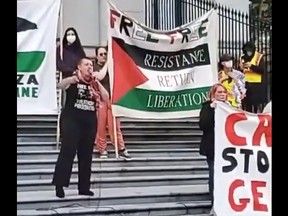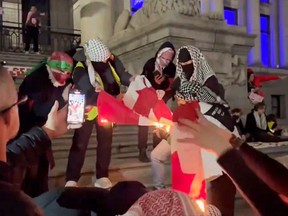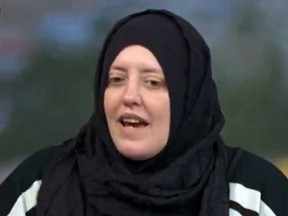Kates made headlines in the spring after Vancouver police arrested her for praising the October 7 attacks by Hamas against Israel as ‘heroic and brave’
Article content
OTTAWA — It was September 2000, and Charlotte Kates was in college when violence erupted in the West Bank and Gaza.
It was the beginning of what would become known as the second intifada — a violent uprising whose Arabic name means “shaking off”— that left around 4,000 civilians dead and saw Palestinian terrorists carry out suicide bombings in Israel, triggering an Israeli military retaliation.
Advertisement 2
Article content
Back in North America, Kates spent that time transforming herself into a controversial anti-Israel activist on campus, drawing both attention and condemnation for promoting Palestinians’ “right to resist” and being an outspoken defender of employing violence.
The same remains true nearly two decades later.
At 44, she made headlines after Vancouver police arrested her in the spring for praising the Oct. 7 attacks by Hamas against southern Israel as “heroic and brave.” At the same rally on the steps of the Vancouver Art Gallery, she led the crowd in a chant of “Long live October 7.” She has yet to be charged, but national Jewish advocacy groups say she ought to be for hate speech.

After this past week, when Canada and the United States listed Samidoun, the organization founded by Kates, as a terrorist entity, the National Post sought to explore her origins, reviewing more than a dozen interviews, talks and other public appearances she has made, almost entirely with like-minded activists.
Samidoun’s chapter in Vancouver, where Kates is based, did not respond to an email requesting an interview.
Advertisement 3
Article content
Getting groups scrubbed from countries’ terror lists is a frequent theme that emerges during Kates’ talks, where she rails against their existence, as she did during one lecture titled: “Criminalizing People’s Liberation Movements.”
Listening to her, terms like “liberation,” “revolutionary” and “imperialist” appear often, which is no coincidence considering that Kates, raised in New Jersey, traces her worldview back to the Soviet Union and the writings of Vladimir Lenin and Karl Marx, from whom she drew inspiration.
A July 2003 New York Times piece that profiled the then 23-year-old activist and law student at Rutgers University detailed how by 13 she had joined a local chapter of the American Communist Party and was discovered by her family, whom she said hailed from working class roots, when she started handing out communist newspapers.
At the time, Kates was one of the leaders of a student group that was stoking controversy for organizing events and making statements against Israel’s existence and offering support for suicide bombings. “It is not our place in the United States to dictate the tactics Palestinian groups use in the liberation struggle,” she said, according to the New York Times.
Article content
Advertisement 4
Article content
The young organizer also told the New York Post that she supports the “Palestinian resistance in all its forms,” as being “a very powerful tool of justice.”
Kates has continued spreading these views today, including to post-secondary students, such as those at Columbia University whom she told during an online seminar this past spring that, “there is nothing wrong with being a member of Hamas,” according to a clip circulated on social media.
Recommended from Editorial
Jewish advocacy groups in both the U.S. and Canada have long followed Kates’ activities, calling on authorities to act.
Reflecting on her activist beginnings in an video interview published on her group’s website last month, Kates recalled that as a student she had already been involved in “progressive, anti-imperialist politics,” particularly around issues involving Venezuela and the Philippines.
“As someone who was in that milieu, I saw Palestine as another anti-imperialist struggle that was important.”
Advertisement 5
Article content
“At this moment,” she says, “it became incredibly urgent to do organizing.”
While people may focus on the student encampments staged at universities around the world this past year, hers was the first generation to demand institutions divest from companies tied to Israel, Kates said.
She remembers it as a crucial time to be in university.
Not only was she exposed to protests across taking place across the U.S. in response to the uprisings in the Middle East from the late 1990s to early 2000s, but also in the aftermath of the Sept. 11 terrorist attacks, which led to the invasion of Afghanistan and a spike in Islamophobia across North America.
“There were protests happening all the time,” she says. “We would attend and we were also talking about, ‘How are we going to start a Palestine solidarity group at our university.’”
Rutgers University confirmed its records show that in 2002, “Charlotte L. Kates” graduated with a bachelor’s degree with a double major in journalism and mass media as well as history and political science from its Douglass College, which had a campus in New Brunswick. Lynn is Kates’ middle name.
Advertisement 6
Article content
An article published in the school’s student newspaper that year also named Kates as one of the undergrads who were protesting a possible tuition hike.
Records show she went on to earn her law degree in New Jersey in 2006 and was admitted to the bar later that year in New York.
A 2005 article outlining the rise in tensions and antisemitism on campuses around that time noted Kates’ notoriety, and how she was among the “key exceptions” to the trend that most pro-Palestinian supporters were Muslim and most pro-Israel supporters were Jewish.
Kates is visibly Caucasian. She has also described herself as not religious.
It is not our place… to dictate the tactics Palestinian groups use in the liberation struggle
In her September 2024 video, Kates said her connections to Canada began as a student, as she would routinely travel to events in Toronto and drew inspiration from pro-Palestinian organizers across different campuses.
“Those of us at Rutgers were taking materials that Concordia (University) was putting out and saying, ‘how can we adapt these and use at our universities.’”
In fact, she said the first time she met her husband in person was during an event in Canada. She and Khaled Barakat have been married for 15 years. The U.S. deems Barakat to be a senior member of the Popular Front for the Liberation of Palestine, which has been designated as terrorist entity in Canada, the U.S., and the European Union.
Advertisement 7
Article content
Barakat often appears alongside Kates at Samidoun speaking events. Public Safety Canada noted the connection between the two groups in its rationale in giving Samidoun the terror label, saying it helps to “advance” the popular front.
Kates has said the couple moved to Vancouver in 2009, as her husband, a Palestinian, is also a Canadian citizen. After graduating from law school, she described getting involved with the “radical legal community,” and travelling to the Middle East.

By 2011, she helped to found Samidoun, which boasts chapters around the world and has the stated purpose of seeking “to achieve justice for Palestinian prisoners,” in Israeli detention through demonstrations and other public events. Earlier this year she travelled to Iran to accept a human rights award, where it also has a chapter.
Many of the prisoners she advocates to be freed have links to “terrorism, assassinations and countless attacks against Israel,” according to Public Safety Canada.
By listing a group as a terrorist entity, it becomes a crime to provide them with material support. Leading up to its listing, Kates’ organization had long sparked concern from political leaders and companies. One point, she told supporters they could only take paper cheques, in light of the restrictions placed on them.
Advertisement 8
Article content
Being banned is familiar territory for Kates, who was deported from Germany, along with Barakat for conducting similar activities in Berlin in 2019. They were barred from returning to the European Union for four years.
As temporary residents, she said they were able to be ordered out of Europe.
However, both are Canadian citizens.
National Post
staylor@postmedia.com
Get more deep-dive National Post political coverage and analysis in your inbox with the Political Hack newsletter, where Ottawa bureau chief Stuart Thomson and political analyst Tasha Kheiriddin get at what’s really going on behind the scenes on Parliament Hill every Wednesday and Friday, exclusively for subscribers. Sign up here.
Our website is the place for the latest breaking news, exclusive scoops, longreads and provocative commentary. Please bookmark nationalpost.com and sign up for our daily newsletter, Posted, here.
Article content









